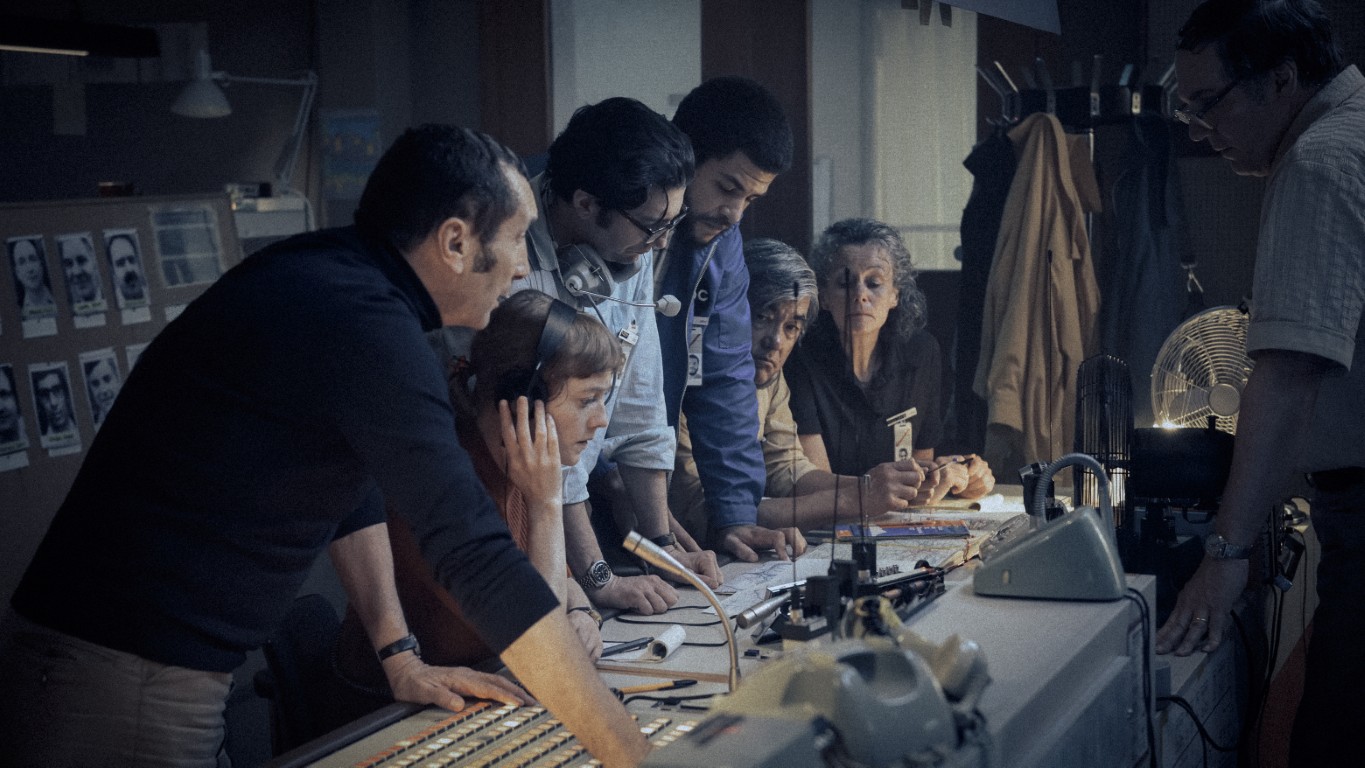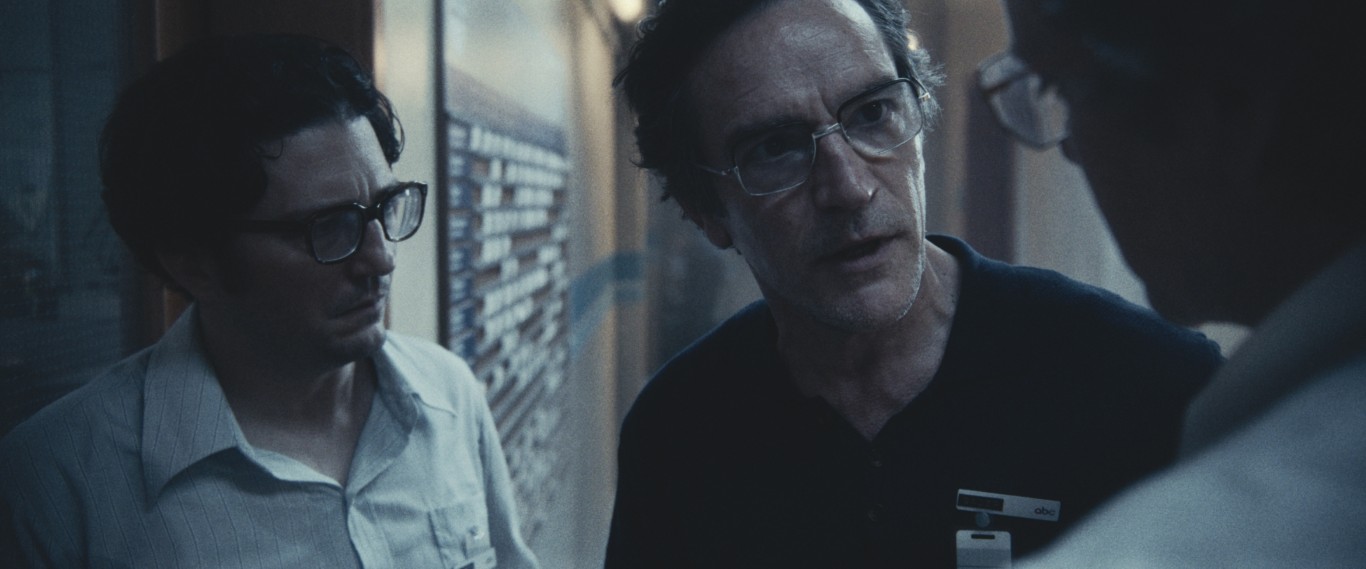“September 5” is the story of a small group of ABC Television sports journalists covering the 1972 Munich Olympics when Baader-Meinhof terrorists attacked Israeli athletes. The ABC team, the only ones with a camera inside the Olympic village, made an instant switch to cover breaking news. In an interview, director/co-screenwriter Tim Fehlbaum and actors Ben Chaplin (who plays an ABC producer) and Leonie Benesch (who plays the German translator) talked about the differences in technology and journalism since 1972, why Chaplin’s character is the moral compass of the story, and the interview question that women journalists keep asking.
For me, this seems to be a quintessential American story. Yet I cannot help noticing that I’m the only American in this room. What does your perspective bring to this story?
Tim Fehlbaum: When we’re in Germany, the Germans say this film looks so not German. Which is a compliment. We all admire, of course, the American cinema. Maybe the interesting thing is that it was kind of the same constellation of nationalities as it was in real life. We were shooting in Munich. It was set in Munich. It was a lot of people from Munich. And we had Marianne’s character, who is from Germany. But our crew had a lot of international actors. Geoffrey Mason [played by John Mangaro in the film] told us that ABC hired an international crew. There were not only Americans on the crew. So that’s reflected, in a way, in our cast. And I think it makes a difference.
Ben Chaplin: I think that a lot of the time it takes an outsider’s perspective. For example, I would love to point out that one of the best films that has ever been made, in my opinion the best film that has ever been made about a particular part of time in German history, is a film from the UK, “The Zone of Interest” from Jonathan Glazer. When I watched it, I sat there wishing or wondering why this film didn’t come out of Germany. But sometimes the perspective of the outsider is actually really helpful in terms of telling a story about something. It’s the Martians’ perspective. I think the best adaptation of Jane Austen is “Clueless.” I genuinely do. I think it’s as funny as Jane Austen was meant to be.
Today’s audiences will be struck by the difference in technology and the difference in journalistic standards. Which has changed more dramatically?
Leonie Benesch: They are connected. I’ve never had a TV, and I don’t actually watch that kind of thing but from what I understand, the whole idea of 24 hours news and that horrible term infotainment have made the difference. Journalists are under a lot of pressure to provide instant updates with no time to check and the crossover of information and entertainment means that it’s very difficult, especially in America, to find news that explains a thing that happened as opposed to a crazy story that will make you feel very emotional. That is not particularly helpful. It’s spread globally as well through the influence of social media.
TF: The technology is the frightening part and the sad part. It is increased exponentially to the point where you and i could do a broadcast here now you can’t control. The technology obviously has changed but the bigger questions have not. They are still the same exactly, like with confirmed sources and the pressure of being first without making a mistake. And what do we show when it comes to violence? When are we telling the story and when do we become part of the story that makes it more dangerous? The interesting thing about “September 5” is that we are telling it from the point of view of sports broadcasters who suddenly are confronted with these questions. A few hours earlier they were reporting on Mark Spitz’s seventh gold medal.

Marianne Gebhard (Leonie Benesch),
Geoff Mason (John Magaro),
Carter (Marcus Rutherford) star in Paramount Pictures’ “SEPTEMBER 5” the film that unveils the decisive moment that forever changed media coverage and continues to impact live news today, set during the 1972 Munich Summer Olympics.
Leonie, I want to ask about your character, the only German and the only woman working at ABC. She plays a huge narrative function but also a huge emotional function in the story. That all comes together in a scene where a man asks her to get coffee, not just condescending but making the only person who can translate what they are reporting leave the room.
LB: First of all, I’d love to point out that with just one exception, the only journalists to ask me about that scene are women and I think that is very telling. It’s very interesting that only one male journalist talked about that scene.
BC: There haven’t been that many male journalists!
LB: [Laughs] Go, Ben! Get us some coffee!
go, leave.
BC: I would happily, happily do it.
LB: It’s very beautiful, what [screenwriters] Moritz Binder, Tim Fehlbaum, and Alex David have written. In that heavily male dominated world, to then write a fully fleshed-out three-dimensional female character who gets to be the hero a lot of the time. She saves the day, and she has cool moments and then the feminist punchline, and all that, that’s just a gift to play. I was very happy to read it and even happier to play it. I’m very grateful.

Ben, your character is assessing and participating in a lot of decisions very quickly.
BC: He’s there in an advisory capacity more than making the decisions and questioning the decisions that are being made. I thought that what the script did was clever in terms of having my character, Marvin, the logistics planning man. It stands to reason therefore that he would be someone who might have his eye on potential problems before anyone else. His job was to identify potential problems and mistakes down the road. It helps the audience understand the stakes and the risks.
TF: We described him as a moral compass.
I know you did a lot of research, including interviews with many of the people portrayed in the film. What did you discover that surprised you?
TF: There were so many things. But I just didn’t know before what an important moment in the media history that was. I had to learn about that era. Even before the terrorist attack happened, it was a turning point. The 1972 Olympics were a turning point in media history, because Germany wanted to send a message with the first Olympics on German soil since 1936, which was misused for fascist propaganda. Germany wanted to send out a new image to the world. That’s the reason they didn’t have any armed police inside the Olympic Village. They did not want a bad association.
Also, for the first time, the venues were planned for optimal TV coverage and the events could be broadcast live worldwide. And then suddenly this whole apparatus switched from the Olympics to reporting on the crisis. It was the first time that there were actually live images of a crisis like this. There were many TV stations on that day on the Olympic lot, but ABC was the only one to have a live camera on site. It was just across the hill from the exit of their studio. They had this idea: “Why don’t we just wheel out one of our cameras and point it at the building where this is going on?”




